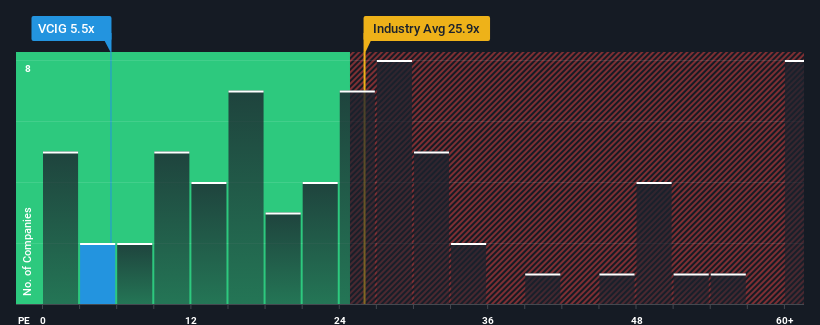- United States
- /
- Professional Services
- /
- NasdaqCM:VCIG
VCI Global Limited (NASDAQ:VCIG) Stock's 26% Dive Might Signal An Opportunity But It Requires Some Scrutiny
VCI Global Limited (NASDAQ:VCIG) shareholders that were waiting for something to happen have been dealt a blow with a 26% share price drop in the last month. The recent drop completes a disastrous twelve months for shareholders, who are sitting on a 69% loss during that time.
Even after such a large drop in price, VCI Global may still be sending very bullish signals at the moment with its price-to-earnings (or "P/E") ratio of 5.5x, since almost half of all companies in the United States have P/E ratios greater than 18x and even P/E's higher than 32x are not unusual. However, the P/E might be quite low for a reason and it requires further investigation to determine if it's justified.
Recent times have been quite advantageous for VCI Global as its earnings have been rising very briskly. One possibility is that the P/E is low because investors think this strong earnings growth might actually underperform the broader market in the near future. If you like the company, you'd be hoping this isn't the case so that you could potentially pick up some stock while it's out of favour.
View our latest analysis for VCI Global

What Are Growth Metrics Telling Us About The Low P/E?
There's an inherent assumption that a company should far underperform the market for P/E ratios like VCI Global's to be considered reasonable.
Taking a look back first, we see that the company grew earnings per share by an impressive 55% last year. Pleasingly, EPS has also lifted 805% in aggregate from three years ago, thanks to the last 12 months of growth. Accordingly, shareholders would have probably welcomed those medium-term rates of earnings growth.
Comparing that to the market, which is only predicted to deliver 13% growth in the next 12 months, the company's momentum is stronger based on recent medium-term annualised earnings results.
In light of this, it's peculiar that VCI Global's P/E sits below the majority of other companies. It looks like most investors are not convinced the company can maintain its recent growth rates.
What We Can Learn From VCI Global's P/E?
VCI Global's P/E looks about as weak as its stock price lately. Using the price-to-earnings ratio alone to determine if you should sell your stock isn't sensible, however it can be a practical guide to the company's future prospects.
We've established that VCI Global currently trades on a much lower than expected P/E since its recent three-year growth is higher than the wider market forecast. When we see strong earnings with faster-than-market growth, we assume potential risks are what might be placing significant pressure on the P/E ratio. At least price risks look to be very low if recent medium-term earnings trends continue, but investors seem to think future earnings could see a lot of volatility.
We don't want to rain on the parade too much, but we did also find 5 warning signs for VCI Global (1 is concerning!) that you need to be mindful of.
If you're unsure about the strength of VCI Global's business, why not explore our interactive list of stocks with solid business fundamentals for some other companies you may have missed.
New: Manage All Your Stock Portfolios in One Place
We've created the ultimate portfolio companion for stock investors, and it's free.
• Connect an unlimited number of Portfolios and see your total in one currency
• Be alerted to new Warning Signs or Risks via email or mobile
• Track the Fair Value of your stocks
Have feedback on this article? Concerned about the content? Get in touch with us directly. Alternatively, email editorial-team (at) simplywallst.com.
This article by Simply Wall St is general in nature. We provide commentary based on historical data and analyst forecasts only using an unbiased methodology and our articles are not intended to be financial advice. It does not constitute a recommendation to buy or sell any stock, and does not take account of your objectives, or your financial situation. We aim to bring you long-term focused analysis driven by fundamental data. Note that our analysis may not factor in the latest price-sensitive company announcements or qualitative material. Simply Wall St has no position in any stocks mentioned.
About NasdaqCM:VCIG
VCI Global
Provides business and technology consulting services in Malaysia.
Excellent balance sheet and good value.
Market Insights
Community Narratives



